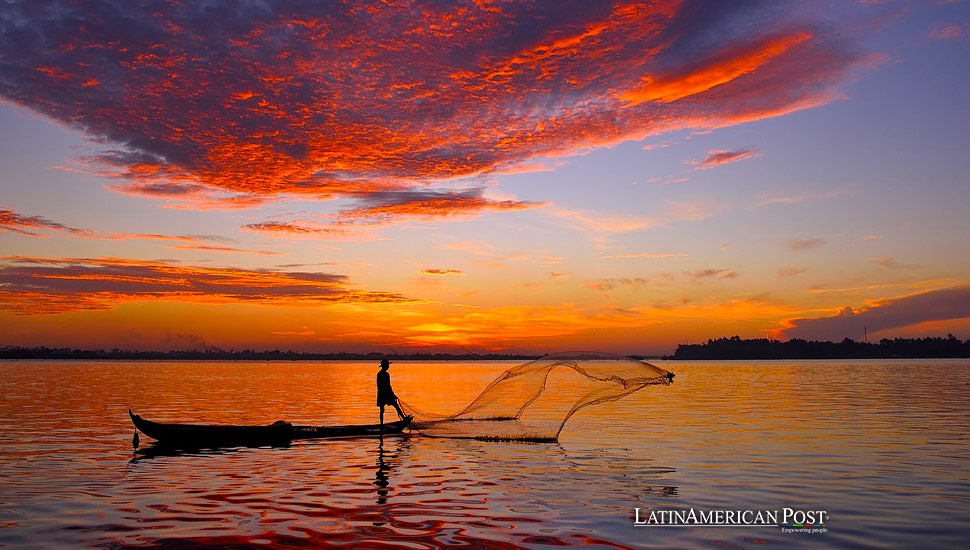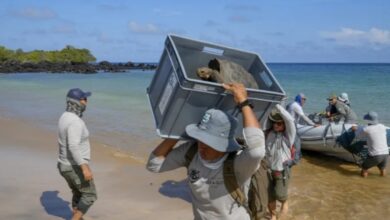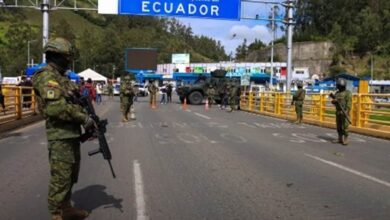USAID Boosts Fishing Capacity in Ecuador’s Galapagos to Enhance Sustainability

USAID has donated equipment to improve the productivity and quality of artisanal fishing in the Galapagos Islands, aiming to enhance local fisheries’ sustainability and economic prospects in the world’s first natural heritage site.
In a significant move to support the artisanal fishing community in the Galapagos Islands, the United States Agency for International Development (USAID) has donated essential equipment to the Cooperativa de Producción Pesquera Artesanal de Galápagos (Copropag). This initiative, aimed at bolstering the local fishing industry, underscores the critical intersection of environmental conservation and economic development in one of the world’s most renowned natural heritage sites.
Daniel Sánchez-Bustamante, Director of USAID’s Mission in Ecuador, detailed the donation, which includes three freezers, two air conditioning units, UV lamps, and personal protective equipment. These enhancements are expected to significantly improve the quality and safety of the fishermen’s catch, enabling them to secure better prices and access new markets such as restaurants, hotels, and cruise ships in the Galapagos.
“This is just the beginning of a significant objective we pursue together: achieving a more modern and beneficial system that conserves our fisheries,” Sánchez-Bustamante said. “Together, we can ensure a prosperous and sustainable future for all.”
Artisanal fishing is a cornerstone of the Galapagos economy, providing livelihoods for many residents while also playing a crucial role in the archipelago’s sustainable development. USAID and WildAid’s collaboration aims to strengthen the cooperative’s infrastructure and ensure that the fishery’s operations meet high standards of quality and sustainability.
The upgrades to Copropag’s facilities include maintaining air conditioning and freezer systems, renewing signage in processing and reception areas, providing uniforms for employees, installing UV insect traps, and adding plastic curtains to prevent contamination. Mauro Albán, President of Copropag, emphasized that these improvements would help unify the cooperative’s members and promote responsible fishing practices.
Historical Context and Conservation Efforts
The Galapagos Islands, located about 1,000 kilometers off the coast of mainland Ecuador, are famous for their unique biodiversity and historical significance. Declared the world’s first UNESCO World Heritage site, the archipelago is a critical area for ecological research and tourism. The sustainability of its natural resources, including its fisheries, is vital to maintaining the balance between human activity and conservation.
In the broader context of Latin American conservation efforts, the Galapagos Islands represent a success story in environmental protection. Initiatives like the USAID donation are part of ongoing efforts to support local communities while preserving the ecological integrity of the islands. Such projects are essential in ensuring that economic activities like fishing do not compromise the region’s unique ecosystems.
Manuel Bravo, Director of WildAid Ecuador, highlighted that the improvements culminate approximately a year of work divided into several phases, with the first phase now completed thanks to a $30,000 investment. Diana Vinueza, WildAid’s Galapagos Project Manager, announced that upcoming enhancements include acquiring a water purification machine and upgrading an ice machine at the collection center. These additions will further improve the cooperative’s service and ensure compliance with safety standards.
Once the facility upgrades are complete, business rounds are planned to expand Copropag’s customer base. Around $100,000 will be invested in fully revitalizing the cooperative, reinforcing the commitment to economic and environmental sustainability.
Broader Impacts and Community Response
The support for Copropag comes amidst broader changes in the Galapagos’ artisanal fishing community. The Municipality of Santa Cruz recently evicted another cooperative from the ‘Pelican Bay dock, a location that had been a hub for fish sales since the 1980s. This eviction has forced 53 fishermen to sell their products from steps or boats while seeking legal redress through the Public Defender’s Office for what they describe as an unjust and unexpected eviction.
The sale of seafood at Pelican Bay was also a popular tourist attraction, adding to the local economy’s vibrancy. The displacement of these fishermen underscores the challenges artisanal fishers face in the Galapagos, highlighting the importance of initiatives like USAID’s support for Copropag in ensuring sustainable livelihoods and environmental stewardship.
International organizations like USAID are crucial in supporting local development efforts, particularly in ecologically sensitive areas like the Galapagos. These organizations help build local capacities by providing resources and expertise, enabling communities to manage their resources sustainably and improve their economic prospects.
The USAID initiative in the Galapagos is part of broader projects such as ‘Por la Pesca’ and ‘Strengthening Conservation in the Protected Areas of Galapagos and Cocos,’ which aim to enhance the management of natural resources and support local communities. These projects reflect a comprehensive approach to development that balances economic needs with conservation priorities.
Future Prospects and Sustainability
Looking ahead, the continued support and collaboration between local cooperatives, international organizations, and government entities will be vital for the sustainable development of the Galapagos. Ensuring that artisanal fishing practices are both economically viable and environmentally sustainable is essential for the long-term health of the archipelago’s ecosystems.
Efforts to modernize fishing operations, improve product quality, and expand market access will help secure the livelihoods of local fishers while maintaining the ecological balance. Training programs, technology upgrades, and infrastructure improvements are critical components of this strategy, providing the tools and knowledge necessary for sustainable practices.
USAID’s donation of equipment to improve the fishing capacity of the Galapagos cooperative marks a significant step towards sustainable development in one of the world’s most important natural heritage sites. By enhancing the productivity and quality of artisanal fishing, this initiative supports the livelihoods of local communities while promoting environmental conservation.
Also read: From Quito to the World: Ecuador’s Beer Excellence
As the Galapagos Islands continue to face challenges related to climate change, population growth, and tourism, integrating sustainable practices in all sectors is paramount. The collaboration between local and international organizations exemplifies how targeted support and investment can drive positive change, ensuring that the unique biodiversity of the Galapagos is preserved for future generations.





